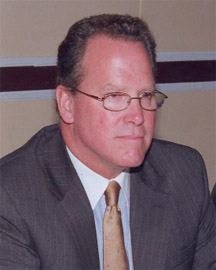The infighting within the PNCR and its leadership’s failure to verify the party’s voters list before its Biennial Congress in 2007 led then US Ambassador to Guyana, David Robinson, to conclude that the party was in a steady state of decline and that the PPP was Guyana’s only viable political party.
It was to no one’s surprise that the PNCR decided to hold their leadership elections despite the “serious questions about the veracity of their membership list. This raises troubling questions,” said Robinson in a cable to Washington at the time. The diplomatic cable was part of a trove released by the whistle-blowing site, Wikileaks, last week.
“First, it is a sign that the PNCR may be heading back to its ‘bad old days’ of dirty politics and rigged elections. Second, and more troubling, is that their recent congress shows a party that is clearly fractured and in a steady state of decline. For the moment, it appears Guyana only has one viable party, the ruling PPP,” Robinson said in the July 23, 2007 cable captioned, ‘PNCR’s Politics as Usual.’

At the 2007 Congress, PNCR leader Robert Corbin ran unopposed after then party central executive member, Vincent Alexander withdrew from the leadership race. Alexander withdrew after he and his team failed in their bid to have the voters list verified. “Alexander’s withdrawal, after the party’s refusal to verify its suddenly increased member list, has led many PNCR supporters to question whether this signifies a return to the old days of dirty politics by the PNCR. Newspaper editorials and man on the street surveys were decidedly critical of the party’s handling of the situation,” Robinson said.
In an earlier cable on the party’s election titled ‘Showdown Looms at Upcoming PNCR Biennial Congress’ Robinson detailed concerns raised by Alexander in an interview with the embassy’s political officer.
“PNCR membership, almost non-existent following the party’s poor showing in the 2006 national elections, has swelled during the last two weeks in anticipation of the leadership showdown. The party’s last-minute refusal to engage in a verification of the members list has Alexander fuming,” the former ambassador said.
The cable pointed to what it termed a “dramatic surge” in the party’s membership in the run up to the congress which, it said, left party members worried about the authenticity of their membership list. According to Robinson since the 2006 national elections, active party membership had remained at approximately 3,000. “Within the last three weeks, however, it has swelled to more than 23,000. While party membership normally grows prior to the Biennial Congress, it usually tops out at 10 000,” he had observed.
The then ambassador stated that the change in the party’s membership had left many PNCR members worried that the list had been fraudulently padded in order to rig the results of the upcoming leadership vote. “To make matters worse, the PNCR Central Executive Committee voted last week to forgo the planned verification of the membership roster,” the cable stated.
Robinson noted that while Alexander had been very public in his push for a change in leadership, Corbin had stressed the need for cohesion in the party.
He said that during an interview with the embassy’s political officer, Alexander had said that his backers had investigated a sampling of the incoming membership applications and they had determined that many were fictitious.
Alexander, Robinson said, went public with his call for verification of the list after his private plea to the Central Executive Committee was ignored. He told the political officer that at that time he had three options: (1) take the issue to court; (2) not participate in party elections; or (3) raise the issue to the party members at the congress. He later acknowledged that legal action could take years to complete, and option 2 would have definitively resulted in defeat and as such seemed resigned to option three, the cable said.
In an attempt to get a more unbiased view, the political officer spoke with the now deceased Winston Murray, who had expressed “great concern about the possibility of fraudulent membership applications, but was resigned to the fact that there was not enough time left before the congress to adequately verify the list.”
“He also expressed concern about the manner in which Alexander was handling the situation— he said that this is the first time that internal PNCR party politics had been brought out into the public,” Robinson had written and quoted Murray as saying :“This does not bode well for the future.”
Robinson said that the irony appeared to have been lost on the party in its refusal to verify its own party membership list, after it had continuously called for house-to-house verification of the national voter’s list. He said that it was “yet another sign of the party’s state of disarray and decline.”
“One of the main reasons that the PNCR lost ground in last year’s national election is that many younger Guyanese are put off by the party’s old guard leadership and its failure to make room for fresh leaders and fresh ideas. As there was no place for them in the party leadership, young voters cast their votes elsewhere. This battle for leadership between two longtime PNCR stalwarts likely will not help change people’s perceptions of the party,” Robinson said.





